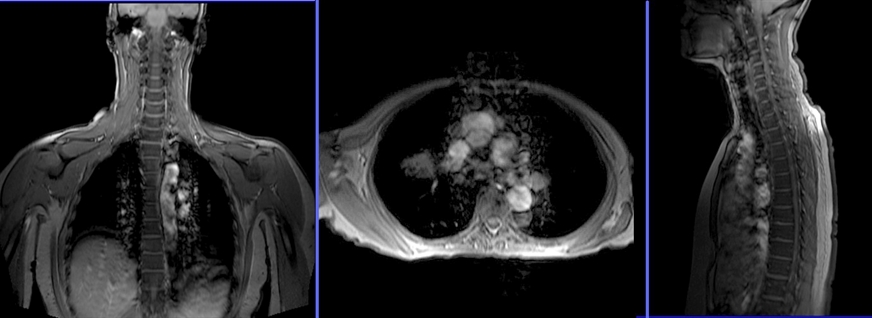MRI Dorsal Spine Scan , When to take , What are the benefits

An MRI (Magnetic Resonance Imaging) of the dorsal spine, also known as the thoracic spine, is a diagnostic imaging technique used to visualize the structures of the middle part of the vertebral column. The dorsal spine consists of 12 vertebrae that are located between the cervical (neck) spine and the lumbar (lower back) spine.
When to take an MRI Dorsal Spine Scan: An MRI Dorsal Spine Scan is usually recommended when a patient presents with symptoms or conditions that may involve the thoracic spine. Some common indications for a dorsal spine MRI include:
Back pain: Persistent or severe back pain in the mid-back region may warrant an MRI to investigate potential causes.
Trauma: If there has been a significant injury or trauma to the mid-back area, an MRI can help assess the extent of damage to the spinal structures.
Suspected spinal cord compression: If there are symptoms suggesting compression of the spinal cord in the thoracic region, an MRI can help identify the cause.
Suspected disc herniation or degeneration: MRI can visualize the intervertebral discs and identify any herniation or degenerative changes that may be causing symptoms.
Numbness, tingling, or weakness: These symptoms in the upper extremities may indicate nerve compression or other spinal cord issues.
Evaluation of tumors or infections: An MRI can be used to assess for the presence of tumors, infections, or other abnormalities in the dorsal spine.
Benefits of an MRI Dorsal Spine Scan:
Detailed visualization: MRI provides high-resolution images of the dorsal spine, allowing doctors to assess the spinal cord, nerves, discs, and other structures with great clarity.
Non-invasive: MRI is a non-invasive procedure that does not involve ionizing radiation, making it safe for most patients.
Early detection and accurate diagnosis: MRI can detect various spinal abnormalities and conditions at an early stage, facilitating timely treatment and better outcomes.
Evaluation of soft tissues: MRI is particularly useful for evaluating soft tissues, such as nerves and intervertebral discs, which may not be well visualized by other imaging methods like X-rays.
Precise treatment planning: By providing detailed information about the spine’s condition, an MRI helps doctors plan appropriate treatments, such as surgery or targeted therapies.
Useful for differentiating conditions: MRI can help differentiate between various spinal pathologies, such as herniated discs, spinal stenosis, tumors, and infections.
It is essential to consult with a qualified healthcare professional or a specialist to determine if an MRI Dorsal Spine Scan is necessary based on your specific symptoms and medical history. The decision to undergo any medical imaging should always be made in consultation with a healthcare provider.
For a painless MRI Scan Chennai, consider Madras Scans & Labs as your go-to destination. It is the most trusted MRI scan center in Chennai with its exceptional and secure diagnostic services at an affordable pricing system.
Give us a quick call at 9514400800 or visit us at https://www.madrasscan.in to know more about MRI Scan and our attractive price package.
